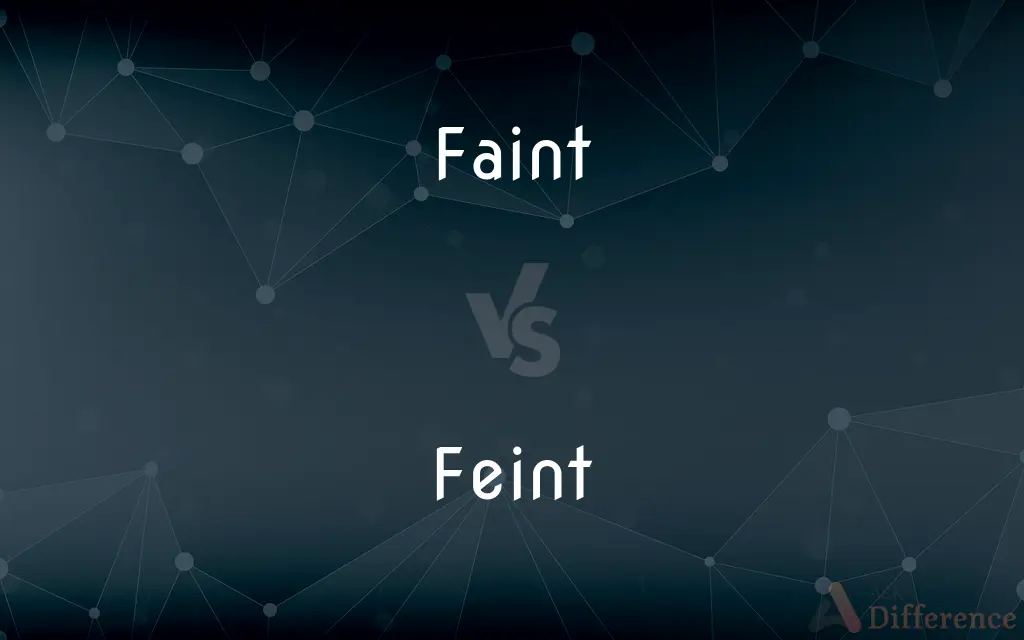Faint vs. Feint — What's the Difference?
By Tayyaba Rehman — Updated on October 5, 2023
Faint refers to a loss of consciousness or a weak sensation, while feint is a deceptive or pretended move, especially in sports or combat.

Difference Between Faint and Feint
Table of Contents
ADVERTISEMENT
Key Differences
Faint and feint, although phonetically similar, carry very different meanings in the English language. Faint often pertains to a brief loss of consciousness or to something that is weak or dim.
In contrast, feint is predominantly used in the context of sports or combat. It describes a deceptive move intended to distract or mislead an opponent. This could be a boxer throwing a punch to misdirect or a soccer player pretending to move one way and then going another.
The term faint can be applied in various contexts outside of physical sensation. For example, a faint sound or a faint light refers to something barely perceptible or weak in its manifestation.
Feint, being more specialized in its usage, is closely associated with strategy and deception. It's an action employed to divert attention, thereby gaining a strategic advantage.
To summarize, while faint describes weakness or a lack of strength and vigor, feint is all about deliberate deception to outmaneuver an opponent.
ADVERTISEMENT
Comparison Chart
Definition
Loss of consciousness or weak sensation
Deceptive or pretended move
Context
Often relates to physical sensations or perceptions
Commonly used in sports or combat
Connotation
Indicates weakness or subtlety
Suggests strategy and deception
Verb Form
To faint means to lose consciousness
To feint means to make a deceptive move
Examples
Faint sound, faint light
Feint in boxing, feint in fencing
Compare with Definitions
Faint
Barely perceptible.
There was a faint smell of roses.
Feint
A maneuver designed to distract.
He used a feint to slip past the defender.
Faint
Lacking conviction or force.
His response was a faint attempt at reassurance.
Feint
A pretended attack.
The fencer's feint was expertly executed.
Faint
Pale or weak in appearance.
She gave a faint smile.
Feint
A trick or ruse.
The feint left everyone in awe of his strategic prowess.
Faint
Done with little strength or vigor; feeble
A faint attempt to apologize.
Feint
A deceptive move in sports or combat.
The boxer made a feint before delivering the knockout punch.
Faint
So weak as to be difficult to perceive; a faint light in the distance; a faint echo.
Feint
A deceptive action to divert attention.
The magician's feint ensured no one saw him switch cards.
Faint
Lacking clarity or distinctness
A faint recollection.
Feint
Feint is a French term that entered English via the discipline of swordsmanship and fencing. Feints are maneuvers designed to distract or mislead, done by giving the impression that a certain maneuver will take place, while in fact another, or even none, will.
Faint
Small in degree or amount; meager
Faint chance of getting a raise.
Feint
A military attack or maneuver that is meant to divert attention away from a planned point of attack.
Faint
Lacking conviction, boldness, or courage; timid
A tourist who is faint at heart.
Feint
A body movement that is intended to divert another's attention, often by being deliberately left uncompleted
"The mongoose begins with a feint, which provokes the snake to strike" (Norbert Wiener).
Faint
Likely to fall into a faint; dizzy and weak
Felt faint for a moment.
Feint
A deceptive action calculated to divert attention from one's real purpose.
Faint
An abrupt, usually brief loss of consciousness, generally associated with failure of normal blood circulation.
Feint
To make a feint
"He feinted with his left hand, trying to distract the turtle and then grab its tail" (Howard Frank Mosher).
Faint
To fall into a usually brief state of unconsciousness.
Feint
To deceive with a feint
He feinted his opponent with a left hook.
Faint
(Archaic) To weaken in purpose or spirit.
Feint
To do or perform as a feint
Feinted a punch.
Faint
(of a being) Lacking strength; weak; languid; inclined to lose consciousness
I felt faint after my fifth gin and tonic.
Feint
A movement made to confuse an opponent; a dummy.
Faint
Lacking courage, spirit, or energy; cowardly; dejected
Feint
A blow, thrust, or other offensive movement resembling an attack on some part of the body, intended to distract from a real attack on another part.
Faint
Barely perceptible; not bright, or loud, or sharp
There was a faint red light in the distance.
Feint
(figuratively) Something feigned; a false or pretend appearance; a pretence or stratagem.
Faint
Performed, done, or acted, weakly; not exhibiting vigor, strength, or energy
Faint efforts
Faint resistance
Feint
To direct (a blow, thrust, or other offensive movement resembling an attack) on some part of the body, intended to distract from a real attack on another part.
Faint
Slight; minimal.
Feint
(rare) To direct a feint or mock attack against (someone).
Faint
(archaic) Sickly, so as to make a person feel faint.
Feint
To make a feint or mock attack.
Faint
The act of fainting, syncope.
She suffered another faint.
Feint
Of an attack or offensive movement: directed toward a different part from the intended strike.
Faint
(rare) The state of one who has fainted; a swoon.
Feint
(obsolete) Feigned, counterfeit, fake.
Faint
(intransitive) To lose consciousness through a lack of oxygen or nutrients to the brain, usually as a result of suddenly reduced blood flow (may be caused by emotional trauma, loss of blood or various medical conditions).
Feint
Of lines printed on paper as a handwriting guide: not bold; faint, light; also, of such paper: ruled with faint lines of this sort.
Faint
(intransitive) To lose courage or spirit; to become depressed or despondent.
Feint
Feigned; counterfeit.
Dressed up into any feint appearance of it.
Faint
(intransitive) To decay; to disappear; to vanish.
Feint
That which is feigned; an assumed or false appearance; a pretense; a stratagem; a fetch.
Courtley's letter is but a feint to get off.
Faint
Lacking strength; weak; languid; inclined to swoon; as, faint with fatigue, hunger, or thirst.
Feint
A mock blow or attack on one part when another part is intended to be struck; - said of certain movements in fencing, boxing, war, etc.
Faint
Wanting in courage, spirit, or energy; timorous; cowardly; dejected; depressed; as, "Faint heart ne'er won fair lady."
Feint
To make a feint, or mock attack.
Faint
Lacking distinctness; hardly perceptible; striking the senses feebly; not bright, or loud, or sharp, or forcible; weak; as, a faint color, or sound.
Feint
Any distracting or deceptive maneuver (as a mock attack)
Faint
Performed, done, or acted, in a weak or feeble manner; not exhibiting vigor, strength, or energy; slight; as, faint efforts; faint resistance.
The faint prosecution of the war.
Feint
Deceive by a mock action;
The midfielder feinted to shoot
Faint
To sink into dejection; to lose courage or spirit; to become depressed or despondent.
If thou faint in the day of adversity, thy strength is small.
Faint
To decay; to disappear; to vanish.
Gilded clouds, while we gaze upon them, faint before the eye.
Faint
To cause to faint or become dispirited; to depress; to weaken.
It faints me to think what follows.
Faint
A spontaneous loss of consciousness caused by insufficient blood to the brain
Faint
Pass out from weakness, physical or emotional distress due to a loss of blood supply to the brain
Faint
Barely perceptible; lacking clarity or brightness or loudness etc;
A faint outline
The wan sun cast faint shadows
The faint light of a distant candle
Faint colors
A faint hissing sound
A faint aroma
Faint
Lacking clarity or distinctness;
A dim figure in the distance
Only a faint recollection
Shadowy figures in the gloom
Saw a vague outline of a building through the fog
A few wispy memories of childhood
Faint
Lacking strength or vigor;
Damning with faint praise
Faint resistance
Feeble efforts
A feeble voice
Faint
Weak and likely to lose consciousness;
Suddenly felt faint from the pain
Was sick and faint from hunger
Felt light in the head
A swooning fit
Light-headed with wine
Light-headed from lack of sleep
Faint
Indistinctly understood or felt or perceived;
A faint clue to the origin of the mystery
Haven't the faintest idea
Faint
Lacking conviction or boldness or courage;
Faint heart ne'er won fair lady
Faint
A brief loss of consciousness.
She felt dizzy and had a faint.
Faint
Lacking strength or clarity.
The note had a faint signature.
Common Curiosities
Is the pronunciation of faint and feint the same?
Yes, they are homophones.
Is feint always about deception?
Primarily, yes; it often refers to a deceptive move or action.
Can a sound be feint?
No, a sound can be faint (soft), but not feint (deceptive).
Can someone faint from a feint in boxing?
Theoretically, if the deceptive move (feint) leads to a powerful punch.
Can you feint in games like chess?
Yes, using a move to deceive or distract an opponent is a form of feint.
Is feinting considered cheating in sports?
No, it's often a legitimate strategy, but it depends on the sport's rules.
Does something faint always lack strength?
Typically, yes; it indicates weakness or lack of intensity.
How can one differentiate between faint and feint in writing?
Remember, faint relates to weakness while feint is about deceptive movement.
Are faint and feint interchangeable?
No, faint refers to weakness, while feint pertains to deception in movement.
Does faint always mean a loss of consciousness?
No, it can also refer to something weak or barely perceptible.
Share Your Discovery

Previous Comparison
Mediation vs. Arbitration
Next Comparison
Garage vs. PorchAuthor Spotlight
Written by
Tayyaba RehmanTayyaba Rehman is a distinguished writer, currently serving as a primary contributor to askdifference.com. As a researcher in semantics and etymology, Tayyaba's passion for the complexity of languages and their distinctions has found a perfect home on the platform. Tayyaba delves into the intricacies of language, distinguishing between commonly confused words and phrases, thereby providing clarity for readers worldwide.
















































